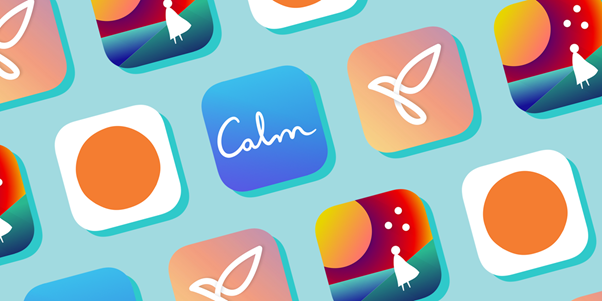The Boom of Mental Health Apps: Transforming Well-being in the Digital Era

In the digital and quick-paced reality of today, mental well-being has become a burning issue for people of all ages. Fortunately, technological advancements have paved the way for the development of mental health apps, giving the world a handy and accessible means of support. This piece explores the field of mental wellness apps, examining their soaring demand, diverse categories, mental health app features, crucial attributes, emerging trends, a comprehensive development roadmap, and potential revenue streams.
Decoding Mental Health Apps
In simple terms, mental health apps are software applications aimed at fostering mental well-being, providing support, and aiding in the management of various mental health conditions. These apps equip users with tools, resources, and techniques to enhance their mental health and overall quality of life.
The Craze for Mental Health Apps: Let the Numbers Do the Talking
The popularity of mental health apps has witnessed an unprecedented surge in recent times, spurred by the rising popularity and prioritization of mental well-being. Consider the following statistics:
- A survey carried out by the National Institute of Mental Health reveals that one out of five adults in the United States experienced mental illness in 2021.
- The global market for mental health apps is projected to reach a staggering value of $3.9 billion by 2027, with an impressive compound annual growth rate (CAGR) of 22.8% from 2020 to 2027.
- The COVID-19 pandemic has further emphasized the need for mental health support, with a significant upswing in anxiety, depression, and stress-related disorders.
Unveiling the Assortment of Mental Health Apps: Catering to Diverse Needs

The world of mental health apps presents an expansive range of choices, each catering to distinct needs and preferences. Let’s dig deeper into some of the different types, each providing unique forms of support and assistance:
a. Zen and Serenity Apps: Apps like Headspace and Calm serve as virtual havens, guiding users through meditation practices, breathing exercises, and mindfulness techniques. With their tranquil backgrounds and soothing voices, they help users unwind, alleviate stress, and find inner peace amidst the chaos of everyday life.
b. Emotion Trackers: Apps such as Daylio and Moodpath aid users in monitoring and comprehending their emotional well-being. By allowing individuals to log their moods, track patterns, and gain valuable insights, these apps empower users to maintain emotional equilibrium.
c. Cognitive Behavioral Therapy (CBT) Companions: MoodTools and Woebot are examples of apps employing CBT techniques. They assist users in identifying and challenging negative thoughts, managing anxiety and depression, and fostering healthier mental patterns. Through interactive exercises, cognitive restructuring, and mood diaries, these apps equip users with practical tools to reshape their thinking and enhance overall well-being.
d. Mental Health Communities: Apps like 7 Cups and Wisdo create virtual communities where individuals can connect with like-minded people, share experiences, and seek peer support. These platforms foster a sense of belonging and understanding, serving as safe spaces for individuals to express themselves and receive encouragement from others who have encountered similar struggles.
e. Therapy-on-Demand Apps: Talkspace and BetterHelp connect users with licensed therapists through secure messaging, voice, or video calls, offering convenient access to professional guidance. These apps provide a wide range of therapeutic options, allowing individuals to schedule sessions, seek tailored support, and receive assistance from the comfort of their own homes.
By offering a diverse array of mental health apps, developers cater to the unique needs and preferences of individuals seeking support, empowering them to take charge of their mental well-being in ways that resonate with their personal journeys.
Vital Features of Mental Health Apps
To deliver a comprehensive and effective user experience, mental health apps should incorporate the following features:
a. Personalized Assessments: Initial assessments to understand the user’s mental health needs and provide tailored recommendations.
b. Progress Tracking: Tools for tracking and visualizing progress in mental well-being, fostering motivation and self-reflection.
c. Educational Resources: Reliable information, articles, and videos related to mental health, empowering users with knowledge.
d. Reminder and Notification System: Gentle reminders for self-care activities, medication schedules, or therapy sessions.
e. Secure Communication: If offering therapy services, secure and encrypted communication channels to ensure user privacy and confidentiality.
Emerging Trends in Mental Health App Development
As technology advances, mental health apps evolve as well. Here are some emerging trends in this field:
a. Artificial Intelligence (AI) Integration: AI-powered chatbots and virtual assistants offering personalized recommendations and support.
b. Wearable Device Integration: Syncing with wearable devices to track physical and mental health data, taking a holistic approach.
c. Gamification: Incorporating game-like elements to make mental health activities engaging and motivating.
d. Virtual Reality (VR): Immersive VR experiences for exposure therapy, anxiety reduction, and stress management.
A Guide to Developing a Mental Health App
If you’re considering developing a mental health app, follow these steps:
a. Define Your App’s Purpose and Target Audience: Identify the specific mental health issue you aim to address and the audience you want to serve.
b. Conduct Thorough Market Research: Understand existing competitors, user expectations, and potential market gaps.
c. Collaborate with Mental Health Professionals: Seek advice of experts in the field of mental health to make sure the application adheres to standard procedures and ethical considerations.
d. Design a User-Friendly Interface: Create an intuitive and visually appealing interface that facilitates easy navigation and engagement.
e. Test and Iterate: Conduct rigorous testing to identify and address any usability issues, ensuring a seamless user experience.
f. Launch and Gather User Feedback: Release your app to the market and actively seek user feedback for continuous improvement.
Monetization Strategies for Mental Health Apps
While the primary goal of mental health apps is to support users, developers also need to consider monetization options. Here are a few strategies:
a. Freemium Model: Offer a free basic version of the app, with premium features available through in-app purchases or subscription plans.
b. Advertising: Incorporate non-intrusive advertisements or sponsorships to generate revenue.
c. Partnerships and B2B Services: Collaborate with mental health organizations, clinics, or employers to offer tailored solutions and services.
d. Data Analysis and Research: Analyze anonymized user data and sell insights to researchers or healthcare institutions.
Conclusion
Mental health apps have transformed the approach to mental well-being, providing a wide range of tools, resources, and communities. With essential features, awareness of emerging trends, and a comprehensive development guide, developers can create impactful mental health apps that cater to the needs of millions. Additionally, considering appropriate monetization strategies allows for sustainable growth and continuous innovation in this crucial field.








[…] the next ten years, mobile health applications are anticipated to become increasingly commonplace. Customers may maintain their personal health […]
[…] suffering may be a factor in mental health conditions including depression and anxiety, which may call for professional […]
[…] about someone. Just focus on your happiness rather than asking bad for someone. Yes, for good mental health, you can seek help from meditation and words from the experts. Along with that, don’t hesitate […]